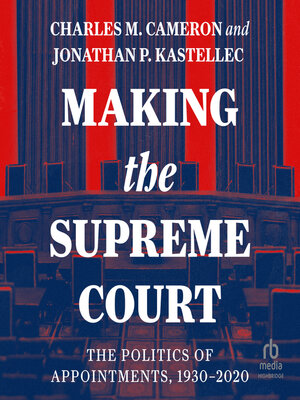Making the Supreme Court
audiobook (Unabridged) ∣ The Politics of Appointments, 1930-2020
By Charles M. Cameron

Sign up to save your library
With an OverDrive account, you can save your favorite libraries for at-a-glance information about availability. Find out more about OverDrive accounts.
Find this title in Libby, the library reading app by OverDrive.



Search for a digital library with this title
Title found at these libraries:
| Library Name | Distance |
|---|---|
| Loading... |
Appointments to the United States Supreme Court are now central events in American political life. However, this has not always been the case. As late as the middle of the twentieth century, presidents invested little time and effort in finding and vetting nominees. Media coverage was desultory, public opinion was largely non-existent, and the justices often voted independently and erratically.
In Making the Supreme Court, Charles M. Cameron and Jonathan P. Kastellec show how the growth of federal judicial power from the 1930s onward inspired a multitude of groups struggling to shape judicial policy. Over time, some groups moved beyond lobbying the Court to changing who sits on it. Other groups formed expressly to influence appointments. These activists and organized groups penetrated the national party system so that after about 1980, presidential candidates increasingly pledged to select and confirm nominees who conformed to specific policy and ideological litmus tests. Once in office, these presidents reshaped the executive selection system to deliver on their promises. As Cameron and Kastellec argue, the result is a new politics aimed squarely at selecting and placing judicial ideologues on the Court. They make the case that this new model gradually transformed how the Court itself operates, turning it into an ideologically driven and polarized branch.
In Making the Supreme Court, Charles M. Cameron and Jonathan P. Kastellec show how the growth of federal judicial power from the 1930s onward inspired a multitude of groups struggling to shape judicial policy. Over time, some groups moved beyond lobbying the Court to changing who sits on it. Other groups formed expressly to influence appointments. These activists and organized groups penetrated the national party system so that after about 1980, presidential candidates increasingly pledged to select and confirm nominees who conformed to specific policy and ideological litmus tests. Once in office, these presidents reshaped the executive selection system to deliver on their promises. As Cameron and Kastellec argue, the result is a new politics aimed squarely at selecting and placing judicial ideologues on the Court. They make the case that this new model gradually transformed how the Court itself operates, turning it into an ideologically driven and polarized branch.







